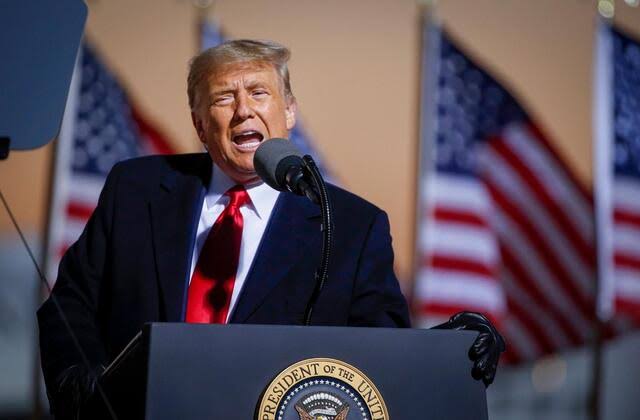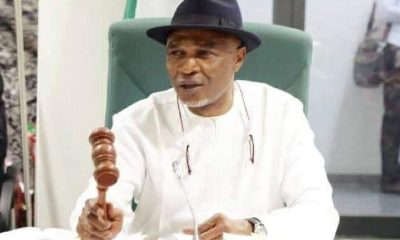News
Immigration groups sue Trump over order to end US birthright citizenship

By Francesca Hangeior
United States President Donald Trump has been sued by immigration advocates following his move to end automatic citizenship for children born in the United States to parents who are unlawfully or temporarily in the country.
On Monday, Trump signed an executive order at the White House aimed at ending the longstanding policy of birthright citizenship.
The order, which is set to take effect in 30 days, challenges more than a century of US policy and court interpretations of the Constitution.
According to a Bloomberg report, immigration advocates swiftly filed a lawsuit in New Hampshire on Monday evening, shortly after the order was signed.
During a briefing on Monday, Trump reiterated his commitment to the controversial policy change.
“The federal government will not recognize automatic birthright citizenship for children of illegal aliens born in the United States. We are also going to enhance vetting and screening of illegal aliens,” he said.
Ending birthright citizenship has been a cornerstone of Trump’s Agenda47 policy platform, with the campaign promising to clarify the Constitution’s 14th Amendment.
The campaign emphasised that citizenship should apply “only to those both born in AND ‘subject to the jurisdiction’ of the United States.”
To defend the policy, the Justice Department will need to convince courts to adopt a narrower interpretation of the Constitution, which some conservative legal scholars advocate.
The legal challenge could potentially reshape the understanding of the 14th Amendment, which was ratified in 1868 to grant citizenship to formerly enslaved people. Its Section 1 states: “All persons born or naturalized in the United States, and subject to the jurisdiction thereof, are citizens of the United States and of the State wherein they reside.”
While the clause “subject to the jurisdiction thereof” typically excludes children of foreign diplomats, the Supreme Court has consistently affirmed birthright citizenship for children born on US soil, despite numerous challenges over the years, according to the American Immigration Council.
Among the executive orders President Donald Trump signed just hours after taking office as the 47th President of the United States of America, USA, was the one directing government agencies to stop issuing citizenship documentation for babies born in the US to parents without legal status.
Immigration advocacy groups have already gone to court. It is expected that more lawsuits will follow, given the controversial nature of the orders.
Meanwhile, there is need to understand the workings of the American citizenship by birth, and then what Trump’s executive order means.
Passed by Congress June 13, 1866, and ratified July 9, 1868, the 14th Amendment extended liberties and rights granted by the Bill of Rights to formerly enslaved people.
A major provision of the 14th Amendment was to grant citizenship to “All persons born or naturalized in the United States,” thereby granting citizenship to formerly enslaved people.
Note that it was adopted in 1868 after the Civil War to clarify the status of formerly enslaved people.
However, it has long been read as giving citizenship to nearly all babies born on US soil.
This has seen many Nigerians, who have the means, preferring to give birth to babies in the US, as it makes them citizens with full rights as Americans.
With Trump’s executive order, titled “Protecting the Meaning and Value of American Citizenship,” taking effect from February 20, there is need to understand it workings.
News
FAAC shares N1.578tr to federal, states, councils for March 2025

Monthly disbursements to the federal, states and local government areas dropped for the third consecutive time yesterday. The Federation Account Allocation Committee (FAAC) shared N1.58 trillion to the three tiers for March
The committee announced N2. 411 trillion as the total revenue generated in March at its April meeting in Abuja yesterday.
The total distributable revenue comprised N931.325 billion from statutory sources, N593.750 billion from Value Added Tax (VAT), N24.971 billion from the Electronic Money Transfer Levy (EMTL) and N28.711 billion from Exchange Difference revenue.
According to the communiqué issued by FAAC, the gross revenue available for March stood at N2.411 trillion. The deductions for cost of collection stood N85.376 billion, while N747.180 billion went to transfers, interventions and refunds accounted consumed.
Despite the lower net revenue available for distribution, the March statutory revenue of N1.718 trillion showed an increase of N65.422 billion over the N1.653 trillion received in February.
However, revenue from Value Added Tax (VAT) dropped to N637.618 billion last month from the February figure of N654.456 billion – a decrease of N16.838 billion.
From the total distributable sum of N1.578 trillion, the federal government received N528.696 billion; states collectively got N530.448 billion, while the 774 local government areas received N387.002 billion. Additionally, N132.611 billion – representing 13 per cent of mineral revenue – was allocated to oil-producing states as derivation revenue.
The breakdown of the N931.325 billion statutory revenue shows that the federal government took N422.485 billion, the states got N214.290 billion and N165.209 billion shared to the councils. The oil-producing states received N129.341 billion from this component as derivation revenue.
From the VAT pool of N593.750 billion, the federal government got N89.063 billion, states got N296.875 billion and the local government areas got N207.813 billion.
For the EMTL revenue of N24.971 billion, the federal government took N3.746 billion, states received N12.485 billion and local government areas went home with N8.740 billion.
In the case of Exchange Difference revenue of N28.711 billion, the federal government received N13.402 billion, states N6.798 billion and local government areas was allocated N5.241 billion. A further N3.270 billion from this revenue was distributed as 13 per cent derivation to oil-producing states.
A deeper look into the revenue trends shows that while Petroleum Profit Tax (PPT) and Companies Income Tax (CIT) increased significantly during the month under review, several other key sources witnessed declines.
These include Oil and Gas royalty, EMTL, VAT, Excise Duty, Import Duty, and Common External Tariff (CET) Levies.
News
Nigeria Police face backlash over viral cash gift video

A viral video showing several Nigerian police officers allegedly receiving N5,000 each from a Chinese man and his family has sparked widespread outrage and renewed concerns over corruption and ethics in the Nigeria Police Force.
The footage, which surfaced online, shows uniformed officers lining up as a Chinese man hands them cash gifts.
The incident has drawn sharp condemnation from the public and human rights advocates, who described it as disgraceful and damaging to the image of the police.
When contacted by Vanguard, Force Public Relations Officer, ACP Olumuyiwa Adejobi, said he was unaware of the viral video or the incident.
Similarly, the Lagos State Police Command distanced itself from the footage. Its spokesperson, CSP Benjamin Hundeyin, clarified that the incident did not occur in Lagos, contrary to claims circulating online.
Public figures have also weighed in. Omoyele Sowore, former presidential candidate of the African Action Congress (AAC), described the video as “shameful” and called for the removal of the IGP.
“This is why I keep saying illegal IGP Kayode Egbetokun must leave the police force. It is the shame of the nation,” he wrote in a Facebook post.
Popular social commentator and human rights activist Martins Victor Otse, also known as VeryDarkBlackMan, called the act “disgraceful, disrespectful, and degrading,” urging the police leadership to address the matter transparently.
The incident has intensified calls for accountability, with many Nigerians demanding disciplinary action and systemic reforms to restore public confidence in the police force.
News
Easter celebration: FG declares Friday, Monday public holidays

The Federal Government has declared Friday, April 18, and Monday, April 21, 2025, as public holidays to mark Good Friday and Easter Monday.
This was disclosed by the Minister of Interior, Dr Olubunmi Tunji-Ojo, on Tuesday.
He emphasised the importance of embodying the virtues of the sacrifice and love displayed by Jesus Christ, who had to die for the redemption of man, while greeting Christians on the joyous occasion.
In a statement by the Permanent Secretary in the ministry, Dr Magdalene Ajani, the minister called on Nigerians to use the holiday period to pray for the peace, unity, and stability of the nation.
He reassured citizens of President Bola Tinubu’s commitment to the Renewed Hope Agenda, which seeks to foster national growth and development.
“Furthermore, he encouraged Nigerians to extend love and goodwill to their neighbours through acts of kindness and generosity.
“The minister wished all Christians a blissful Easter celebration and extended warm holiday greetings to all Nigerians,” the statement added.
-

 News20 hours ago
News20 hours agoTears, anguish as Plateau Community buries 51 killed by bandits
-

 News20 hours ago
News20 hours agoSHOCKING! One month after giving birth, woman discovers another baby in her womb
-

 News18 hours ago
News18 hours agoCBEX: 60 fraudulent Ponzi scheme operators to avoid in Nigeria
-

 News19 hours ago
News19 hours agoAngry investors raid CBEX office, loot assets in Ibadan after digital Platform crash
-

 Politics20 hours ago
Politics20 hours agoIgbo Youths Set To Mobilize 5 Million Man-March In Support Of Tinubu, Kalu
-

 News19 hours ago
News19 hours ago‘Not something I’d wish on anyone’ — Melinda Gates opens up on divorce
-

 News16 hours ago
News16 hours agoAgbakoba questions inconsistencies in Natasha’s sexual harassment allegations against Akpabio
-

 News14 hours ago
News14 hours agoReps Minority Caucus decries incessant tanker fire explosions, call for decisive actions to avert future occurrences


















